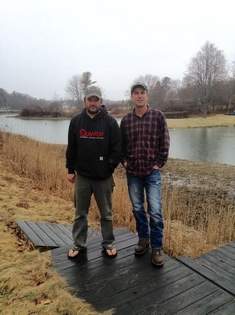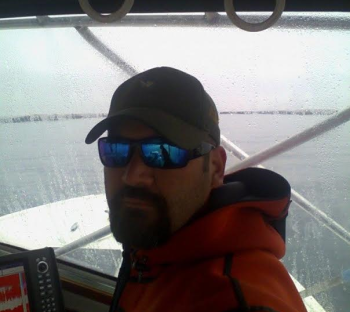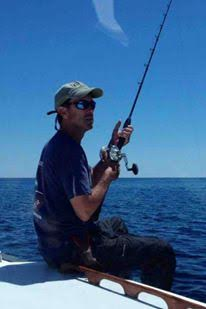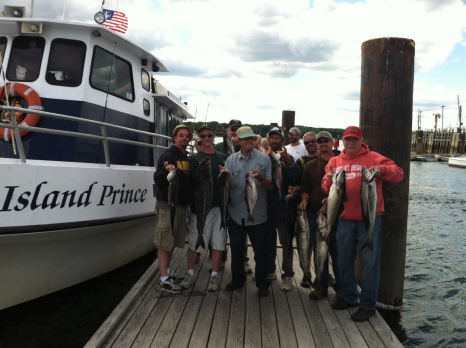Shelley Wigglesworth – Fishermen denied disaster relief funds
On March 1, 2016 The Maine Department of Marine Resources announced it will soon be issuing the third and final payment to Maine-home ported commercial Northeast Multispecies (groundfish) permit holders to provide direct assistance under federal disaster relief funding which is being issued due to changes in fishing regulations and cutbacks in the industry.

Shawn Tibbetts of the Miss Megan II in Saco and Pete Morse from
Teazer Charters, Portland are two of the fishermen denied DMR federal
disaster relief funds.
This is the third and final bin of money being allotted in Maine.
Other New England states have also received federal relief funding in three separate dispersions, and although it is federal money, each state has individual discretion on how to allocate use of the funds. While some other states divided the money among permit holders and in some cases, their crews, Maine chose a formula based criteria for fishermen in this category to qualify for
relief funds.
Last week, many charter/for hire boats in Maine received notification from the DMR that because of Maine’s criteria, they will not be eligible for any of these relief funds in bin 3 which was estimated to be in the $75,000 range and was intended for the charter/for hire sector as other sectors have already received compensation. This has this sector of fishermen very concerned about the method of qualification which excludes many of them and for the future of their livelihood altogether.
Last year alone, newly imposed regulations made it illegal to retain any cod fish, and haddock retention was reduced to 3 fish per person on charter/for hire trips. Captains said these restrictions combined with the limited window of days to actually be at sea each season has severely impacted their income and income potential, and it has them worried about the future of their fishing businesses which they have worked for years to build.
Meredith Mendelson, Deputy Commissioner, federal policy issues, budgets, legislation and emerging issues for the Maine Department of Marine Resources was not able to answer questions about how many fishermen in the charter/for hire sector were eligible for relief funds and how much was dispersed to eligible recipients, stating that the information is “confidential, pursuant to 12 MRS
Section 6173, as it is based on fisheries information reported to the Department” though she did explain the breakdown of the criteria needed to make fishermen eligible.
“The use of the relief funds in Maine was determined by the Commissioner of Marine Resources Patrick Keliher, along with me ( Deputy Commissioner ) and the Director of External Affairs, Terry Stockwell. We established these criteria by making an assessment of the level of trips that we felt represented a full time charter operation that could provide primary income (75 trips, targeting any species). We chose 2012 as the baseline year for reference. and at this point we required active charter trips in 2015 to demonstrate that the business had not failed for reasons other than the disaster declaration for Gulf of Maine cod and ensuing restrictions.”
She added “The three of us (Keliher, Stockwell and Medelson) also had many individual conversations with fishermen in both the commercial and party/charter sectors about the best use of these funds.”
United States Marine Veteran and Wells resident Captain Shawn Tibbetts of the F/V Miss Megan II, which docks in Saco, is one of the fishermen denied relief funds. “Basically Maine said in order to be eligible you had to run 75 trips in 2012 and show that 50% were ground fishing. We must also show a 20% decrease in trips to be eligible. That puts just about all of us ineligible as almost all of us participated in other fisheries just to make up for the lost income.”
He elaborated on the difficulties charter/for hire fishermen face meeting the criteria to receive funds. “Our season starts when the kids get out of school and it ends when they go back. We get a few trips prior and after, but the bulk of our money in made in July and August. Of those sixty days you can count on losing at least one day a week due to weather and or cancellations. I run 20-35 miles from home in a 35 foot boat with passengers-for safety reasons and passenger comfort. To be able to go out 75 days in that period of time is unrealistic.”
Buxton resident, Captain Pete Morse of Teazer Charters in Portland agreed with Tibbetts. “I was shocked to see the amount of trips required. My season is from Memorial Day to Labor Day, that’s just over 90 days. In order for me to be eligible, it would have to be flat calm, no wind and no fog not to mention a line of clients waiting to go. We struggle to even book trips, and when you tell them (potential customers) we can’t even retain some species, it’s ‘thanks but no thanks, goodbye.'” Morse said he has lost many of his repeat “freezer fillers” (non-tourist customers who go out to catch fresh fish to fill their freezers to eat and not as a recreational sport) He added ” I can clearly see how some of my competition has thrown in the towel and gone on to work another job, they make it very hard to make a living. Those who came up with these standards to qualify, obviously have never tried to make their sole living running a 6 passenger vessel in the state of Maine.”
One fisherman pointed out that the number of fish retained played only a small role, if any when it comes to the equation/formula used to decide who gets relief funds in their category as the bulk of the money they have lost comes from the lack of clients who pay to go out fishing, therefore reducing the amount of trips the can take which is also a factor in the equation deciding who gets relief money.
Representatives from the DMR said that in addition to consulting with the New England Fishery Management Council Recreational Party and Charter Advisory Panel, fishermen were also invited beforehand to voice their opinions and concerns as to how the funds should be determined and allotted during the public meetings held on the disaster relief funds, and that their opinions were taken into consideration.
Tibbetts said he attended those meetings and made his recommendations well known, though he feels his suggestions “fell on to deaf ears.” While Morse said he was discouraged from attending the meetings altogether by the DMR. “I was told if I could go if I wanted to, but that I would likely the only one there representing the charter fleet as it was mostly the non-charter ground fishermen who were heavily involved.”
Tibbetts added “There’s only about 40 of us altogether who are charter head boat permit holders total in the state. Of those, most of them don’t offer ground fish charters and there might be 15 that are actually active. I have only heard of one vessel in the entire charter/for hire fleet that actually did qualify for the funds.”
Six charter/for hire Captains were asked if they qualified for relief funds for this article. Of the six, five were denied and one qualified. Captain William “Tim” Tower, of the Bunny Clark in Ogunquit said he believes he qualified. Tower, who also sits on the New England Fishery Management Council Recreational Party and Charter Advisory Panel said “I have heard that I qualify. But as to the details of qualification, all I know is that the DMR is interested in for hire boats where their sole source of income is from taking anglers groundfishing. Obviously, if charter/head boats also go after sharks, tuna, stripers, bluefish, mackerel, etc. their qualifications for receiving money would be less. The target for this relief money is to those who have suffered due to the groundfish regulations.”
Captain John L. Ellis 3rd, of Camp Ellis and Captain John’s Charters aboard the Island Prince, Camp Ellis, Saco said that there is no doubt in his mind that they all suffered loss. While Tibbetts and
Morse said they hold second jobs as truck drivers in addition to fishing to make up for loss and to simply make ends meet.
Ellis commented “It seems like if we are all in the same category and are all actively working, why not just split it and keep it fair for everyone involved? We all lost money whether we went 75 trips or not.”
In response to the questions posed by charter/for hire fishermen that the money intended for relief was made almost impossible to obtain by many charter/for hire boat owners, Mendelson said “Disaster relief funds are not simple to allocate, as we lack the data necessary to accurately and meaningfully assess how someone’s business has changed due to changing regulations. In all sectors (commercial, party/charter, shore side, etc), there are almost always individuals or businesses who feel that they should have received some or more funding.” She added “This decision is final, so
there are no further actions related to disaster relief funding.”
Tibbetts said he and other fishermen in his position who were were counting on the disaster relief money to literally “stay afloat” feel that they were “let down and misled” and that they are very concerned about the future of their businesses. He added that a group of them have reached out to Congresswoman Chellie Pingree for help.
“At this point I have no choice but to look for a full time job to support my family and my charter business. This is shameful. We worked very hard to build this business and client base, and it slowly all being taking away.”








